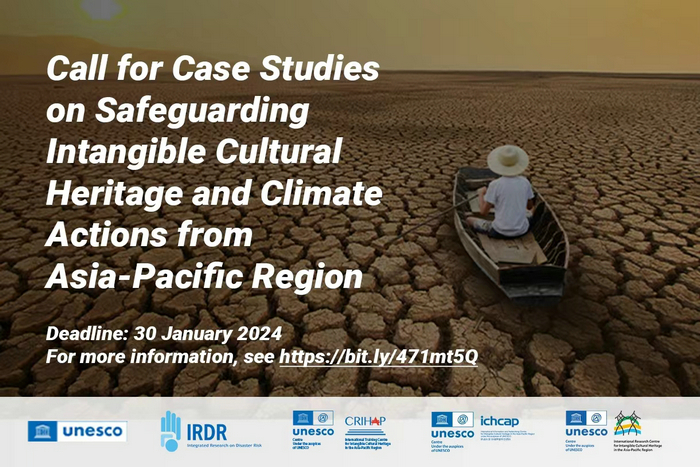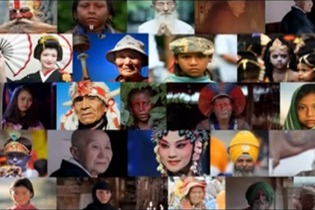Call for Case Studies on Safeguarding Intangible Cultural Heritage and Climate Actions from Asia-Pacific Region

UNESCO is inviting interested teams and individuals to submit case studies from Asia and the Pacific that illustrate the roles and risks of intangible cultural heritage in the context of climate change. This call is launched in the framework of UNESCO’s efforts to contribute to a holistic approach to heritage safeguarding and sustainable development under the 2003 Convention for the Safeguarding of the Intangible Cultural Heritage, including in the context of climate change. This initiative is furthermore in line with the Final Declaration of the UNESCO World Conference on Cultural Policies and Sustainable Development (MONDIACULT 2022), which commended the new impetus given to the role of culture for sustainable development, as a force for resilience, social inclusion and cohesion, environmental protection and sustainable and inclusive growth.
This call is co-launched by the Integrated Research on Disaster Risks (IRDR) and 3 centers under the auspices of UNESCO – International Training Center for Intangible Cultural Heritage in the Asia-Pacific Region (CRIHAP), International Information and Networking Center for Intangible Cultural Heritage in the Asia-Pacific Region (ICHCAP) and International Research Center for Intangible Cultural Heritage in the AsiaPacific Region (IRCI).
Background
Intangible cultural heritage (ICH) is defined in the 2003 Convention as ‘the practices, representations, expressions, knowledge, skills – as well as the instruments, objects, artefacts and cultural spaces associated therewith – that communities, groups and, in some cases, individuals recognize as part of their cultural heritage’. It includes traditions or living expressions inherited from our ancestors and passed on to our descendants, such as oral traditions, performing arts, social practices, rituals, festive events, knowledge and practices concerning nature and the universe and the knowledge and skills to produce traditional crafts. The importance of ICH is not the cultural manifestation itself but rather the wealth of knowledge and skills that is transmitted through it from one generation to the next. Communities and groups decide if they attribute heritage value to their expressions and practices. No outside expert can do it for them.
ICH is more commonly described using a range of synonyms, notably living heritage, because it is dynamic, constantly recreated by the communities who transmit it to the next generation. ICH is a broad concept, but may also include indigenous knowledge, local knowledge, indigenous technical knowledge (ITK), traditional ecological knowledge (TEK), urban knowledge and vernacular knowledge, as well as terms for practices such as craft, agriculture, animal husbandry, wildlife tracking, wild food gathering, wayfinding and navigation, transmissions or changes to seasonal calendars, traditional weather forecasting, performing arts, social practices, rituals and ceremonial events.
Climate change and increased variability in the frequency, intensity and extent of climate-related disasters, including sea-level rise, heatwaves, cyclones, droughts, wildfires and flooding, represent a major challenge to the safeguarding of ICH worldwide. Climate change also has slow onset characteristics which include changes in biodiversity, disease changes, behavioural changes in wild and domestic species, and changes to the hydrological cycle. Specific threats include disruption of livelihoods and accelerated loss of knowledge bearers, the displacement or relocation of whole communities, and the destruction or loss of access to the settings and resources needed for communities to practice and transmit their ICH. But intangible cultural heritage or living heritage is also an exceptional source of climate resilience, providing a basis for ongoing coherence of communities, and continuity of cultural expression and identity, as well as a framework for comprehending and communicating strategies for adaptation to changing conditions. Climate change has triggered adaptations by communities all over the world. Some of these entail modifications of traditional practices, food systems, rituals and seasonal cycles. New forms of practices, culture and use of natural resources may be currently emerging.
The Paris Agreement adopted at the UN Climate Change Conference (COP21) in 2015 specifies that adaptation action ‘should be based on, and guided by the best available science and, as appropriate, traditional knowledge, knowledge of indigenous peoples and local knowledge systems’. Climate change is currently understood largely through modern science. The international instruments concerning climate change rarely mention intangible cultural heritage, including both the risks to it caused by climate change and its contribution to address this global phenomenon. Yet, the human experience of that change is usually specific to locations and particular communities, making the nature of climate change impact vary from one location to the next. Understanding the local scale of experience is critical to the formulation of adaptive responses to climate change. ICH that relates to particular local environments or to the management of specific natural hazards thus provides a highly relevant and significant resource for mapping climate change adaptation strategies in the past and planning for future responses.
It has therefore become apparent that climate change science cannot provide a total framework for understanding vulnerability and modelling adaptation pathways at a local or regional level. Instead, culturally informed approaches to risk are critical to the development and implementation of successful adaptation policy, and the assumptions underpinning these attitudes need to be understood. Local histories also structure and provide socio-economic and political context to a community’s approach to adaptation. Failure to adequately consider or accommodate the cultural, linguistic and historical dimensions of climate change adaptation can undermine the success of an initiative by ignoring the key concerns of communities involved. Rather than being undermined or made irrelevant by changing climatic conditions, ICH is dynamic and capable of responding to future scenarios.
Focus of the case studies
In this context, UNESCO in collaboration with IRDR, CRIHAP, ICHCAP and IRCI will collect case studies from the Asia-Pacific region that can illustrate the dual nature of this intimate and complex relationship between ICH and climate change, looking in particular at three key dimensions: i) roles for ICH; ii) risks for ICH; and iii) strategies for safeguarding ICH in the context of climate change.
Specifically, evidence is sought from a number of case studies that might elaborate responses to one or more of the following questions:
• What roles does ICH play in identifying, assessing and monitoring climate change?
• What roles does ICH play in promoting communities’ adaptation and resilience to climate change?
• What roles does ICH play in mitigating carbon emissions and disaster risk?
• What are the direct and indirect impacts (including cultural, social and economic) and risks to ICH practice, transmission, safeguarding and viability from climate change over the long term?
• What changes to ICH are required for adaptation to climate change?
• What are local and regional strategies for safeguarding ICH in the context of climate change?
The case studies should be grounded in evidence-based research and conducted with the widest possible participation of the community, groups or, if applicable, individuals concerned and with their free, prior and informed consent in line with the Ethical Principles for Safeguarding Intangible Cultural Heritage. The knowledge systems, practices, expressions and skills identified and recognized by communities as part of their ICH will illustrate the links between cultural diversity and environmental sustainability, and provide a foundation for locally-appropriate solutions to sustainable development.
Selected case studies will be co-published by UNESCO and IRDR and feed into UNESCO’s initiative to develop guidance on safeguarding living heritage in the context of climate change. If funding can be mobilized, a conference will be organized to showcase the results and the authors will be invited to deliver presentations on the case studies.
Case studies template
Language: English
Length: 3,000 to 5,000 words
Content:
1. Title of case study
2. Relevant details including author(s) and affiliation, contact details, geographical location, etc.
3. 1 page summary of the case study
4. Background to the case study
5. Statement of the problem
6. Objectives of the case study
7. Research design and methodology
8. Ethics considerations and human rights issues
9. Strengths and limitations of the case study
10. Findings
11. Discussion / Conclusions
12. Recommendations
13. References / Bibliography
14. Photos/ Videos (including copies of consent forms)
Submission details
All submitted case studies are to be sent to beijing.culture@unesco.org before 30 January 2024.
Potential for participating in publication and/or international conferences will be discussed with authors of selected case studies.
References
Adger, W.N., Barnett, J., Brown, K., Marshall, N., & O’Brien, K. 2013. ‘Cultural Dimensions of Climate Change Impacts and Adaptation.’ Nature Climate Change 3(2): 112–117.
https://doi.org/10.1038/nclimate1666
Henderson, M. and Seekamp, E. 2018. ‘Battling the Tides of Climate Change: The Power of Intangible Cultural Resource Values to Bind Place Meanings in Vulnerable Historic Districts.’ Heritage 1(2): 220-238.
Krupnik, I., Rubis, J. T., & Nakashima, D. 2018. ‘Indigenous Knowledge for Climate Change Assessment and Adaptation: Epilogue.’ In D. Nakashima, I. Krupnik, & J. Rubis (eds) Indigenous Knowledge for Climate Change Assessment and Adaptation. Cambridge University Press and UNESCO, pp. 280–290.
https://doi.org/10.1017/9781316481066.021
Makondo, C.C. and Thomas, D.S.G. 2018. ‘Climate Change Adaptation: Linking Indigenous Knowledge with Western Science for Effective Adaptation’. Environmental Science and Policy 88: 83–91.
https://doi.org/10.1016/J.ENVSCI.2018.06.014
Satterthwaite, D. 2011. ‘Editorial: Why is Community Action Needed for Disaster Risk Reduction and Climate Change Adaptation?’ Environment and Urbanization 23(2): 339–349.
https://doi.org/10.1177/0956247811420009

Address: 81, Laiguangying West Road, Chaoyang District, Beijing, China
Zip Code: 100021
Tel: 86-10-64966526
Fax: 86-10-64969281
E-mail: crihap@crihap.cn
Leave us your e-mail address, we'll let you know about current events.



